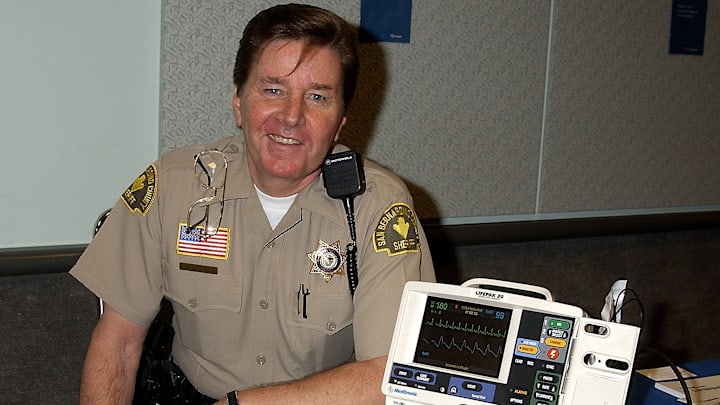This is a music blog, but I want to begin with a story from a different world. In early 1974, a very popular young television star did a guest spot on the drama Emergency! He played a cocky intern who needed to learn to respect the paramedics who serve on the front line of health care.
The actor was Bobby Sherman. He had just passed his 30th birthday and may have been uncertain about his future. Sherman was a pop star and teen idol in his 20s. His good looks and generally affable manner had gained him entry into the world of acting, and it is likely that he was viewing the frequent guest starring that he was doing in the mid-'70s as a likely path forward.
But that’s not what happened. Not exactly. Bobby Sherman was indeed influenced by his appearance on Emergency! But it didn’t push him to pursue similar acting gigs. Instead, it inspired him to train as a paramedic.
Bobby Sherman traded a life of celebrity for one of service
Sherman didn’t exactly give up acting altogether. He continued to appear on television into the next decade. But by the late 1980s, he was working for the Los Angeles Police Department, training other paramedics.
He returned to singing occasionally, performing as part of legends tours with other pop icons from his era. But Bobby Sherman never seemed all that eager to recreate the fame that had once been central to his life.
Sherman’s decision to abandon music may not have been entirely voluntary. His brand of pop was falling out of favor by the mid-'70s. Blond-haired disco pretty boys like Andy Gibb were all the rage, and now in his 30s, Sherman wasn’t likely to maintain that teenybopper appeal.
It may have been different if he were a musician of great proportions. The fact is, he wasn’t. Bobby Sherman could keep time on drums and could strum a guitar, but he was no virtuoso. He did not write hit songs. He did not appear to have a unique musical vision. Even as a singer – the one thing he was most known for – he did not stand out.
But in a way. Bobby Sherman’s success transcended all that. He had a nice voice, and he had the general persona to convince fans that he was someone they would like. Not because he was cool, but because he was just a decent guy who could offer a pleasant song.
It was that persona that got him acting work, and just as in his singing career, he never stood out. But it was always kind of nice to have Bobby Sherman around.
As for that music career, Sherman kicked around throughout the 1960s without much success. Then, in 1969, he wound up with Metromedia, a company that produced both music and television. Through that connection, he met a couple of songwriters who would help launch his mercurial recording career.
Danny Janssen, who was writing a song for David Cassidy to sing during the opening credits of his television show The Partridge Family, wrote a couple of songs that Sherman turned into top ten hits in 1969. “Little Woman” and La La La (If I Had You) were both breezy, feel-good numbers that suited the adorable young singer to a tee.
His follow-up came in 1970, penned by Jack Kirby and Dianne Hildebrand. Kirby was a vet who had written for television since the 1950s. Hildebrand was something of a newcomer. They had written songs for the Monkees, including the weirdly wonderful “Your Auntie Grizelda.” Those songs played off Peter Tork’s outlandish sense of humor.
For Sherman, just a regular good guy, they wrote one of the truly great regular, good guy pop songs of the era. “Easy Come, Easy Go” is not great. Not by a long shot. It’s a fairly simple melody that repeats itself throughout the song. Its message of happy-go-lucky acceptance of whatever life offers is not profound.
Still, as a pop song, with Sherman’s confident delivery, it works as a fabulous guilty pleasure.
Later that year, Sherman struck again with the equally hummable, equally middle-of-the-road “Julie Do Ya Love Me.” Both songs made it into the top ten. Sherman would score one more major hit in 1971 with “Cried Like a Baby.” Then he would kick around for a few more years in the music business, and land more acting gigs before that guest role on Emergency!
Listening to “Easy Come Easy Go” and “Julie Do Ya Love Me” some fifty-five years later, it is easy to write them off as schmaltz from a bygone era. But there is indeed something almost quixotic about them. The songs aren’t great, nor is the production. Sherman’s vocals were nothing special. And yet somehow the total exceeds the sum of the parts.
It is something that cannot be quantified or measured. There was just something inherently decent in Bobby Sherman that came through in his pleasant pop songs. Even when he rocked slightly harder, as on a deeper cut like “Waiting at the Bus Stop,” it just kind of felt nice knowing he was around.
Bobby Sherman died on Tuesday. He was 81 and suffering from kidney cancer. And even though I said earlier that he did not appear to have any remarkable musical vision, in hindsight, he appears to be one of those rare performers whose life may have been encapsulated in one of his biggest hit records.
Bobby Sherman graciously gave up life as a celebrity to take on a career that helped save lives. Easy come, and easy go.
